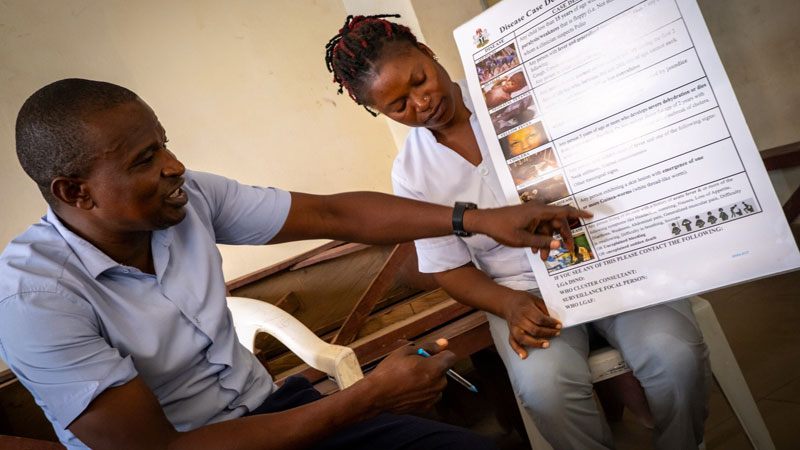
This blog series explores key findings from our 2024 research report Meningitis health communications: Examining channels, messaging and best practice in the African Meningitis Belt. Conducted in partnership with UNICEF, our research investigated practices, barriers, needs and opportunities for greater awareness. Read the third blog in the series here.
“Robust communications strategies are essential in getting information, advice and guidance to the people who most need it.”
Ephrem Tekle Lemango, UNICEF Chief of Immunization
Meningitis is a difficult topic to communicate. It has multiple causes and a broad impact. Fast moving, meningitis can cause outbreaks and epidemics. Last year, we published research from Africa’s meningitis belt, where we asked advocates, healthcare workers and officials how they raise awareness of the disease – its risks, signs, symptoms and after-effects.
Respondents to our research shared valuable insights, including examples of the tools they use for outreach. Building on these examples, we have developed a communications framework that captures best practices from across the region, as well as a set of key messages.
Our meningitis communications framework and key messages are designed to support outreach at every level - from local communities in the Meningitis Belt to global policy leadership.
Community Outreach
Civil society organisations deliver messages about meningitis to local populations, often prioritising caregivers and parents. Communicators at the local level also include trusted members of the community, such as religious leaders and healthcare workers.
Local communicators can apply the framework to present simple, clear messages on the risks and signs of meningitis, alongside opportunities for prevention. By targeting select communications channels, communicators can ensure that crucial information like dates, times and vaccination campaign locations reach the audiences who need it.
National Outreach
Our research confirmed that communicators working in the community often rely on communications tools distributed by government departments, such as Ministries of Health. Governments could use the framework to develop these generalised outreach materials and measure their reach.
Healthcare workers, like doctors and nurses, are an important audience for national-level communications. Accurate, up-to-date messages on incidence, treatment and prevention should be directed to healthcare workers who can then, in turn, distil this information to share with patients or with other key audiences.
Regional Outreach
Policymakers, at the World Health Organization for example, play a critical role in spreading messaging to support meningitis prevention and treatment programs at a regional level. Civil society advocates can engage with policymakers, encouraging them to strengthen and prioritise meningitis prevention, treatment and aftercare.
Consistent, strategic outreach at a regional level can also elevate meningitis among policymaker priorities and influence its inclusion in long-term regional plans. A great example of this is the Framework for the Implementation of the Global Strategy to Defeat Meningitis by 2030 in the WHO African Region.
Global Outreach
Global attention can boost local awareness and we learned that meningitis communicators at all levels value international health observance days as outreach opportunities. As illustrated by the 2024 World Meningitis Day Impact report, these events educate audiences and make the case for investment in prevention and care. The framework can be applied across several audiences and channels for communicating on days like World Meningitis Day and International Day of Persons with Disabilities.
Direct outreach and indirect media coverage from other high-level events, like last year’s first-ever global meeting to defeat meningitis, can also help to propel outreach even further.
Defeating meningitis requires high awareness at all levels. From the world’s largest day of collective action on meningitis, World Meningitis Day, to targeted communications about local vaccination campaigns. Our hope is that, wherever you are, these tools are valuable assets.
Have you used our communications framework and key messages? Please get in touch: advocacy@meningitis.org. We value your feedback as we continue to investigate and improve local, regional and global communications.